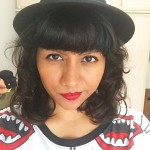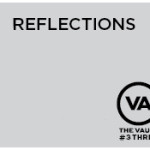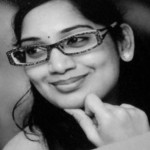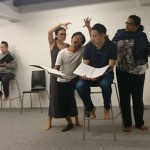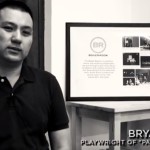Riders Know When It’s Gonna Rain represents the two great loves in playwright Nessa Anwar’s life: motorbikes and theatre. The 26-year-old multimedia producer first wrote the play when Huzir Sulaiman – the artistic director of Checkpoint Theatre and her playwriting mentor in university – invited her to come up with something for What I Love About You Is Your Attitude Problem, an event that’s part of the 2015 Singapore Writers Festival.
The story is centred on the friendship between four motorbike riders – Alep, Remy, Nizam, and the only girl in the group, Risha – and captures the spirit of what it means to be part of this culture. It’s also a deeply personal work for Nessa, as many of the scenes – including some of the most heart-breaking ones – are drawn from her own past. The play, which is performed in Malay, will now be brought back as a full-fledged production at the Singapore Theatre Festival 2016 as part of a double bill, along with Hawa by Hatch Theatrics. Here, Nessa tells us a little bit more about her work and her process.
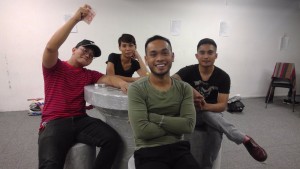
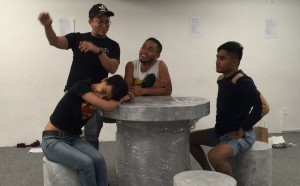
When did you first start riding motorbikes, and what got you into it?
I got my license at 19 and my first bike the next day. I was hanging out with bikers during my mid-teen years and I was very attracted to the tall bikes – I just knew them as scramblers. But I didn’t want to just date a guy on a scrambler, I wanted to ride. And now, seven years and three scramblers and many, many accidents later, I’m still riding.
How would you describe the motorbiking culture in Singapore?
I think we’re lepak and we look out for each other, but we’re a bit lost. We don’t have relaxed regulations, natural landscapes, long roads, our own garages, hills and off-road trails, circuits… we can’t even find parking spaces sometimes. We buy road-illegal dirt bikes to put on trucks to drive up to Malaysia, touring bikes for that one trip every six months to ride up to Thailand, vintage bikes that we pay through our teeth for just to own a license plate from the 1970s. So our bikes are pretty much an extension of what we as riders actually take pride in, and other riders get that. But not all riders live to ride; most actually ride to live – it’s so expensive just to own a bike in Singapore, what more a car?
Is there anything about it that you’d like to debunk?
It’s not easy for an outsider to understand a culture, and it’s cool, but the moment it comes to safety, I believe it’s everyone’s obligation to make an effort. I drive too sometimes, and people become such a horrible version of themselves when they’re on the road. Just look out for bikers; it’s not hard. Teach your kids to count bikes on the road, so that they’ll notice bikes when they drive themselves – that’s a quote that I like a lot.
What was the first staging of Riders at the 2015 Singapore Writers Festival like?
I roped in a couple of friends and a few veterans. Rafaat Hamzah was the director, Najib Soiman helped out, and Hatta Sulaiman found our entire set for us. It was very humbling. It was very indie as well. I was the playwright, producer, actor, wardrobe, make-up etc. My friends were my crew and my cast, and a good friend loaned both his bikes to the production. There were so many challenges but it was so much fun. Our only regret was that it only reached 200 people that night, but now we’re so happy so many more people get to see another subset of Malay culture.
Some parts of Riders are drawn from very personal memories that you or your friends experienced. Why is it important for you to tell these stories?
Because it’s not about bikers vs. anyone else who doesn’t ride a bike. It’s about how bikers – like everyone else – experience things like joy, pain, death. People might not think they have anything in common with that 24-year-old mat rempit biker who races illegally at night, but spend the next hour with him and you’ll realise that you and him are not that different after all. And you’ll look out for him, because you know him. That’s why I wrote the play.
This version of the play is more focused on your character – the only one who’s female. What do you think this brings to the story?
Just like this is not a play about bikers vs. non-bikers, it’s also not about male bikers vs. female bikers. I learnt a lot about my male friends through seven years of riding with them. It’s time they learnt something about us. And then they will realise how different our problems can be from theirs, even though we all ride.
What else is different in this iteration?
I cast the first show, which was very meaningful to me because I wrote the script with the actors in mind. And the actors weren’t actors – Yusuf Haron and Fahmy Riza are literally my friends who I lepaked under the block with, and Riders was the first theatre show they’ve ever been exposed to. I just went, “eh, you guys want to act in a play about bikers?” one night while lepaking, and they went, “what is a play sia?” This time, Raimi Safari and myself are joined by Norisham Osman and Riduan Zalani, who are respected performers in their own right.
What were some of the challenges that you faced as a first-time playwright?
Language was one. It was important to me to keep this play rooted in Malay and bike jargon, but I wanted non-Malay speakers to be able to relate to the story as well. How do you do that? I learnt to give my audience and readers some credit. They know they’re coming to watch a Malay play about bikers. They will take that extra step to understand. My job is to make sure I write a compelling story and create relatable my characters so that it’s worth it.
Also, this is the second time it’s being staged, and the second time I’m acting in it. It’s a challenge in its own right. I don’t want to be known as the playwright who acts in her own plays. I just happen to be a playwright who acts as well. And it’s a semi-autobiographical play. I revisit painful memories each rehearsal. But that’s the beauty of theatre. I’m not a person who finds it easy to exhibit vulnerability. Theatre forces me to do so, and that’s healthy.
What’s your favourite line from the play?
“I have an idea. I ride behind a BMW or a Mercedes, wait for him to U-turn, squeeze to his right, U-turn at the same time, pretend to fall. You guys GoPro from the back. We go to court, easy case, confirm win. At the most I break my leg again, but that $100,000 cash money, we split four.” – Alep
That’s friendship amongst most bikers right there. We hate BMWs, we try to beat the system, we’re not afraid to fall and we share everything, especially cigarettes.
Interview by Gwen Pew
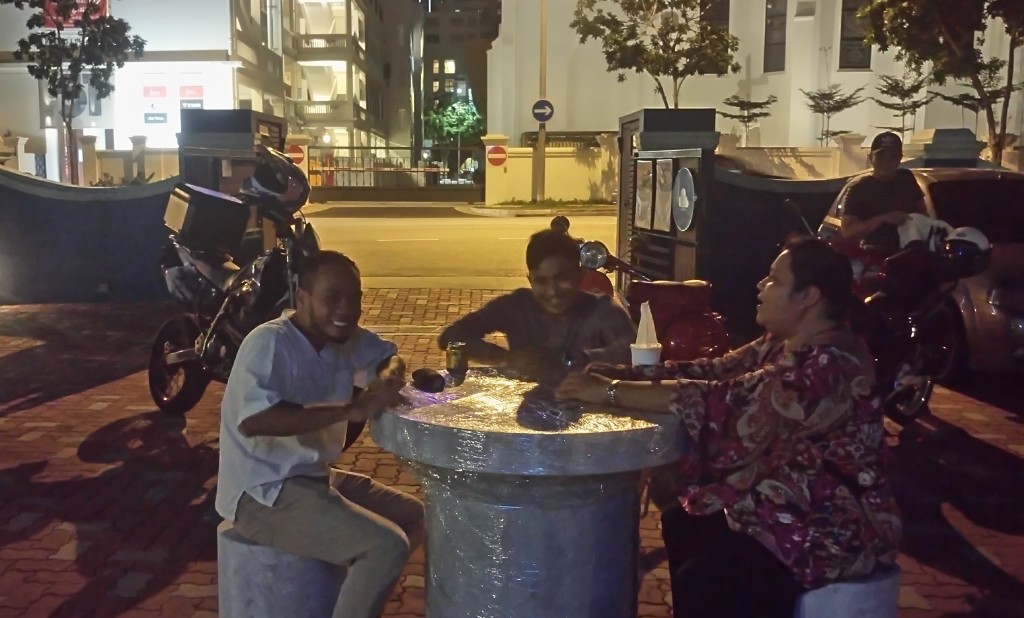 The Riders have been rehearsing in our spaces (indoors and out in the front courtyard) in both iterations of the production since 2015.
The Riders have been rehearsing in our spaces (indoors and out in the front courtyard) in both iterations of the production since 2015.
Catch Double Bill: Riders Know When It’s Gonna Rain / HAWA at Lasalle Creative Cube from 30 June – 3 July 2016.

